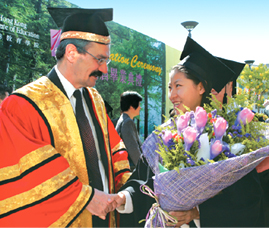 |
 |
 |
 |
 |
 |
 |
 |
 |
 |
 |
 |
 |
 |
 |
 |
 |
 |
 |
| Q: |
The Institute
presented a united front in appealing against
the funding cuts. What were your observations
of the process? |
| A: |
News of the funding cut
came out shortly before the Christmas holidays
in 2004. In the ensuing weeks, Institute staff
and students worked together to lobby against
the Government's proposal. Throughout the process,
they demonstrated a passion for education and
a commitment towards teacher education, which
genuinely touched many Legislative Councillors
as well as the general public. Even though the
funding cut became a reality, both the decision
makers and the public gained a fresh view of the
HKIEd, our community and commitment to teacher
education.
|
|
 |
 |
 |
| |
The major
repercussions of the funding cut, which
was directly linked to the 15% reduction
in student numbers, was the retrenchment
in staff strength. It was a very difficult
exercise and I am deeply grateful for the
understanding and professionalism shown
by the staff who left the Institute on either
the Voluntary Departure or Compulsory Redundancy
Scheme. With the reduction of both student
and staff numbers, the Institute has focused
its resources on core areas which will be
critical in the long term. We are also seeking
to diversify our revenues with additional
measures such as the offering of more self-funded
programmes. These initiatives will become
a core focus, allowing us greater flexibility
and enabling us to become less dependent
on the University Grants Committee as our
only source of funding.
|
| Q: |
Can you talk about
HKIEd's role in the upcoming "3-3-4"
education reforms? |
| A: |
In the next few years,
a central issue for the education community
will be the introduction of what has become
known as the "3-3-4" education
reforms. If it is to be successfully implemented,
we will need a system which facilitates
professional teachers to upgrade their professional
skills to deal with new demands in student
learning and school improvement. Unlike
traditional demarcations where teaching
was categorised into individual subjects
such as Physics, Economics and Geography,
teachers will have to be flexible, with
the ability to work towards subject integration
to offer new subjects such as Liberal Studies
and Career Oriented Studies. They will also
need to adopt new school based assessment
systems. Anticipating these developments,
during the year we developed new programmes
to support these requirements.
An important development with these education
reforms is that Hong Kong is moving away
from a relatively elitist secondary school
system, where only the best students are
selected to receive senior secondary education,
towards a system which will cover all eligible
teenagers. Effectively, the school leaving
age will be raised and teachers will face
a more diverse profile of students, with
very different levels of abilities, motivations
and aspirations. Teachers in turn will need
to develop a range of skills to support
this change.
At HKIEd, we are working in partnership
with schools to help all teachers, be they
novice or experienced educators, to develop
and update their knowledge and skills to
support these improvements in schooling.
|
|
|
 |
 |
 |
 |
| Q: |
The theme
of the Annual Report this year is "What
Makes Us Special?" Can you highlight
the attributes which, in your view, make
HKIEd distinctive? |
| A: |
The most
distinctive feature of HKIEd is a very positive
legacy of our College days and that is the
care and support our staff give to our students.
At the same time, we add significant value
to our students' knowledge, skills and attitudes.
Our students, and in particular those who
have previously experienced alternative
styles of tertiary education, cherish this
fine tradition which we take great pride
in.
I would sum up the key strengths of HKIEd
as follows. We provide novice and serving
teachers with an education that ensures
our students have a thorough understanding
of their subjects - to a level which allows
them to teach others proficiently. They
acquire the knowledge and skills to impart
their knowledge to others, the ability to
handle complex and unforeseen situations,
and awareness of their moral obligations
as professional teachers in the nurturing
of Hong Kong’s future generations.
Very encouragingly schools are recognising
these strengths and this is reflected in
the very high levels of employment of our
graduates.
|
 |
Paul
Morris
President |
|
|
|
 |
 |
 |
 |
 |
|
|
|
 |
 |
|
 |